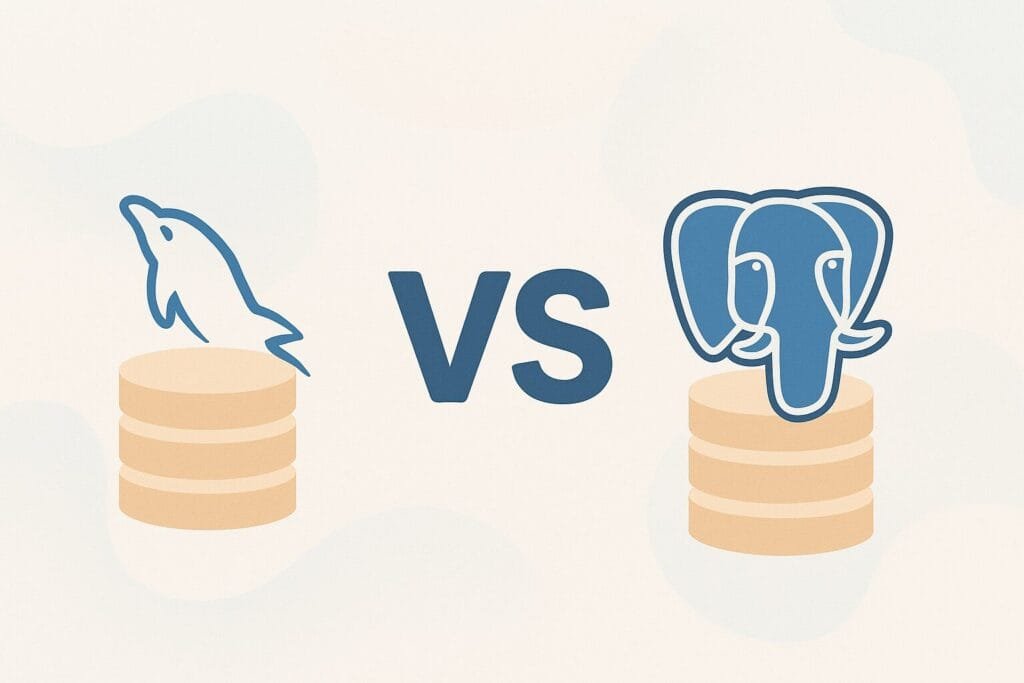When it comes to choosing the right database management system for your application, MySQL vs PostgreSQL is one of the most common debates among developers, startups, and large enterprises. Both are powerful open-source relational database management systems (RDBMS) with a long history and a large community of users. However, they come with different strengths, use cases, and performance characteristics. This article will help you understand the key differences, similarities, and use cases to determine which is the best relational database for your project.

Introduction to Relational Databases
A relational database management system (RDBMS) is a type of database that organizes data into tables with rows and columns. SQL (Structured Query Language) is used to query, manipulate, and manage the data. Both MySQL and PostgreSQL are among the most popular RDBMS in the world today, widely used in web applications, enterprise solutions, and big data analytics.
What Is MySQL?
MySQL is an open-source relational database developed in 1995 and now owned by Oracle Corporation. It is known for its speed, reliability, and ease of use. MySQL is widely adopted for web applications, especially those using the LAMP stack (Linux, Apache, MySQL, PHP/Python/Perl). It is also supported by most major hosting providers and cloud platforms, making it one of the most accessible databases for developers of all levels.
What Is PostgreSQL?
PostgreSQL, also known as Postgres, is an advanced open-source RDBMS that originated in 1986 at the University of California, Berkeley. Unlike MySQL, PostgreSQL focuses heavily on standards compliance, extensibility, and advanced features. It supports a wide range of data types, full-text search, JSON storage, and even custom functions. PostgreSQL is often chosen for applications requiring complex queries, high scalability, and strict data integrity.
Key Differences Between MySQL and PostgreSQL
While both MySQL and PostgreSQL share the same foundation as relational databases, they differ in several ways:
| Feature | MySQL | PostgreSQL |
|---|---|---|
| Release Year | 1995 | 1986 |
| License | GPL (owned by Oracle) | PostgreSQL License (open-source, BSD-style) |
| Performance | Fast read operations, optimized for web apps | Strong with complex queries, large datasets |
| ACID Compliance | Basic ACID support | Fully ACID compliant with strong consistency |
| Supported Data Types | Standard SQL types, limited JSON support | Extensive types including JSONB, arrays, custom types |
| Replication | Master-slave, semi-synchronous | Advanced replication, logical & physical replication |
| Community & Ecosystem | Huge community, widely used in hosting | Growing ecosystem, strong enterprise adoption |
Advantages of MySQL
- Easy to learn and implement, perfect for beginners.
- Excellent performance in read-heavy workloads.
- Widespread adoption and community support.
- Compatible with almost every hosting provider.
- Great for small to medium web applications.
Advantages of PostgreSQL
- Advanced support for complex queries and data analysis.
- Highly extensible with custom functions and data types.
- Full ACID compliance and strict data integrity.
- Better suited for large-scale enterprise applications.
- Strong performance with write-heavy and analytical workloads.
When to Use MySQL
You should consider MySQL if your project involves:
- Simple web applications such as blogs, eCommerce stores, or CMS.
- Read-heavy operations with minimal complexity in queries.
- Applications hosted on shared hosting or cloud providers where MySQL support is readily available.
When to Use PostgreSQL
PostgreSQL is the right choice if your project requires:
- Complex queries and analytics.
- Handling of large datasets with high data integrity.
- Support for custom data types, geospatial data, or JSON storage.
- Enterprise-grade applications with scalability requirements.
Popularity and Market Adoption
According to the latest database ranking from DB-Engines, MySQL and PostgreSQL consistently rank among the top databases worldwide. MySQL remains the most widely used due to its history and strong presence in web hosting. However, PostgreSQL has gained significant traction among developers for its flexibility and advanced features.
Conclusion: Which One Should You Choose?
Ultimately, the decision between MySQL vs PostgreSQL depends on your project requirements. If you are building a lightweight web application with a focus on speed and simplicity, MySQL is an excellent choice. On the other hand, if your project demands advanced features, complex queries, and scalability, PostgreSQL will likely serve you better. Both are powerful open-source solutions, and in many cases, the “best” database comes down to the specific needs of your application and team expertise.
Final Thoughts
MySQL and PostgreSQL are not competitors to eliminate one another, but rather complementary tools in the open-source ecosystem. Many organizations use both depending on the type of project. By understanding their strengths and limitations, you can make an informed choice for your next development project.

